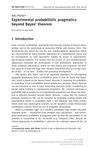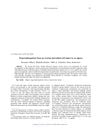 1 citations,
December 2015 in “Balkan Journal of Medical Genetics”
1 citations,
December 2015 in “Balkan Journal of Medical Genetics” Genetic screening can help diagnose and manage infertility in Slovenian couples.
 October 2013 in “Springer eBooks”
October 2013 in “Springer eBooks” PCOS is a hormonal disorder causing infertility and menstrual problems, often linked to obesity and can lead to acne, treated with hormonal and insulin-sensitizing medications.
1 citations,
April 2015 in “Russkij žurnal detskoj nevrologii” Antiepileptic drugs can cause side effects like menstrual problems and infertility in women with epilepsy, but most pregnancies result in healthy babies, with newer drugs being safer.
 February 2020 in “Acta Scientific Women's Health”
February 2020 in “Acta Scientific Women's Health” PCOS is a common condition in women that can lead to infertility and other health issues, and it's diagnosed by specific criteria with various treatment options available.
 35 citations,
January 2011 in “Clinical Endocrinology”
35 citations,
January 2011 in “Clinical Endocrinology” Metformin should be used for PCOS mainly in those with glucose intolerance, and has limited benefits for infertility or hirsutism.
 19 citations,
August 2016 in “Health and Quality of Life Outcomes”
19 citations,
August 2016 in “Health and Quality of Life Outcomes” Metformin helped improve the quality of life for Chinese women with PCOS, especially in physical health and symptoms like infertility, acne, and hair loss.
 10 citations,
December 2019 in “in Vivo”
10 citations,
December 2019 in “in Vivo” Testosterone makes the connections in the uterus lining simpler and lowers certain protein levels, which might lead to infertility.
 August 2008 in “Obstetrics & gynecology science”
August 2008 in “Obstetrics & gynecology science” Polycystic Ovary Syndrome (PCOS) is a complex disorder with both immediate and long-term health effects, including menstrual issues, infertility, and increased risk of diabetes and heart disease.
 February 2018 in “The Journal of Sexual Medicine”
February 2018 in “The Journal of Sexual Medicine” DA-9401 protects against hair loss, improves organ function, and prevents infertility caused by finasteride.
 2 citations,
December 2021 in “Cureus”
2 citations,
December 2021 in “Cureus” Most women with Polycystic Ovary Syndrome (PCOS) have skin issues like excessive hair, acne, or hair loss. Hormone imbalances are common, and age, certain hormones, and hormone ratios can predict acne. Obesity, infertility, and high cholesterol are also common in these women.
 271 citations,
June 2013 in “Human Reproduction”
271 citations,
June 2013 in “Human Reproduction” PCOS is common among Chinese women of reproductive age and linked to serious metabolic and reproductive issues, especially in obese women.
 85 citations,
August 2018 in “Psychological Medicine”
85 citations,
August 2018 in “Psychological Medicine” Women with PCOS are more likely to suffer from depression, anxiety, and stress.
 85 citations,
June 2008 in “Annals of the New York Academy of Sciences”
85 citations,
June 2008 in “Annals of the New York Academy of Sciences” PCOS starts in adolescence with hormonal issues, leading to adult health problems, and early treatment is crucial.
 77 citations,
March 2004 in “Human Reproduction”
77 citations,
March 2004 in “Human Reproduction” Women with irregular periods and/or excessive body hair are more likely to have polycystic ovaries, and this condition is linked to higher health risks.
 71 citations,
November 2009 in “Best Practice & Research in Clinical Obstetrics & Gynaecology”
71 citations,
November 2009 in “Best Practice & Research in Clinical Obstetrics & Gynaecology” PCOS in teens is hard to diagnose, linked to genetics and lifestyle, and managed with weight loss and medication.
 67 citations,
September 2008 in “Dermatologic therapy”
67 citations,
September 2008 in “Dermatologic therapy” Hirsutism is excessive hair growth in women often caused by polycystic ovarian syndrome, and identifying the cause is important for managing associated health risks.
 62 citations,
March 2011 in “European journal of endocrinology”
62 citations,
March 2011 in “European journal of endocrinology” Some parents have a mild form of congenital adrenal hyperplasia without symptoms, and they usually don't need treatment.
 48 citations,
April 2015 in “PLOS ONE”
48 citations,
April 2015 in “PLOS ONE” Excessive hair growth affects the quality of life of Iranian women with PCOS the most.
 29 citations,
March 2015 in “Clinical Endocrinology”
29 citations,
March 2015 in “Clinical Endocrinology” South Asian women with PCOS present with different symptoms compared to White women, influenced by ethnicity, obesity, and age.
 29 citations,
November 2011 in “Human Fertility”
29 citations,
November 2011 in “Human Fertility” Many women with PCOS have undiagnosed health issues and show different symptoms based on the clinic they visit.
 28 citations,
August 2009 in “Nursing for Women's Health”
28 citations,
August 2009 in “Nursing for Women's Health” Cognitive behavioral strategies help women with PCOS make lifestyle changes to improve their health.
 23 citations,
December 2006 in “Evaluation and Program Planning”
23 citations,
December 2006 in “Evaluation and Program Planning” The document suggests a new model for evaluating public research that better captures the full value of knowledge creation and use, using PCOS research as an example.
 21 citations,
January 2003 in “Seminars in reproductive medicine”
21 citations,
January 2003 in “Seminars in reproductive medicine” The document concludes that various drugs can manage symptoms and metabolic issues in women with PCOS.
 16 citations,
November 2018 in “Singapore Medical Journal”
16 citations,
November 2018 in “Singapore Medical Journal” Primary care for PCOS focuses on lifestyle changes, medication based on symptoms, and mental health, with diabetes screening and specialist referral for severe cases.
 11 citations,
November 2006 in “Journal of Veterinary Diagnostic Investigation”
11 citations,
November 2006 in “Journal of Veterinary Diagnostic Investigation” An alpaca acted like a male and couldn't have babies because of a benign tumor in its ovary that caused high testosterone levels.
 10 citations,
January 2019 in “Archives of Endocrinology and Metabolism”
10 citations,
January 2019 in “Archives of Endocrinology and Metabolism” Testosterone therapy may slightly increase sexual desire in women with HSDD but lacks broad recommendation due to safety concerns and limited approval.
 9 citations,
April 2020 in “Endocrinology, diabetes & metabolism case reports”
9 citations,
April 2020 in “Endocrinology, diabetes & metabolism case reports” Pregnancy with Cushing's syndrome is rare and risky for both mother and baby, needing early diagnosis and treatment.
 7 citations,
February 2018 in “Australian Prescriber”
7 citations,
February 2018 in “Australian Prescriber” Some sports supplements can cause health issues like mood swings, hair loss, and heart problems in men.
 4 citations,
January 2018 in “Elsevier eBooks”
4 citations,
January 2018 in “Elsevier eBooks” Hormones are crucial for regulating body functions and imbalances can lead to health issues.
 3 citations,
August 2017 in “International journal of reproduction, contraception, obstetrics and gynecology”
3 citations,
August 2017 in “International journal of reproduction, contraception, obstetrics and gynecology” People with PCOS have higher levels of PAI-1, which may increase their risk of heart disease and fertility issues.





























